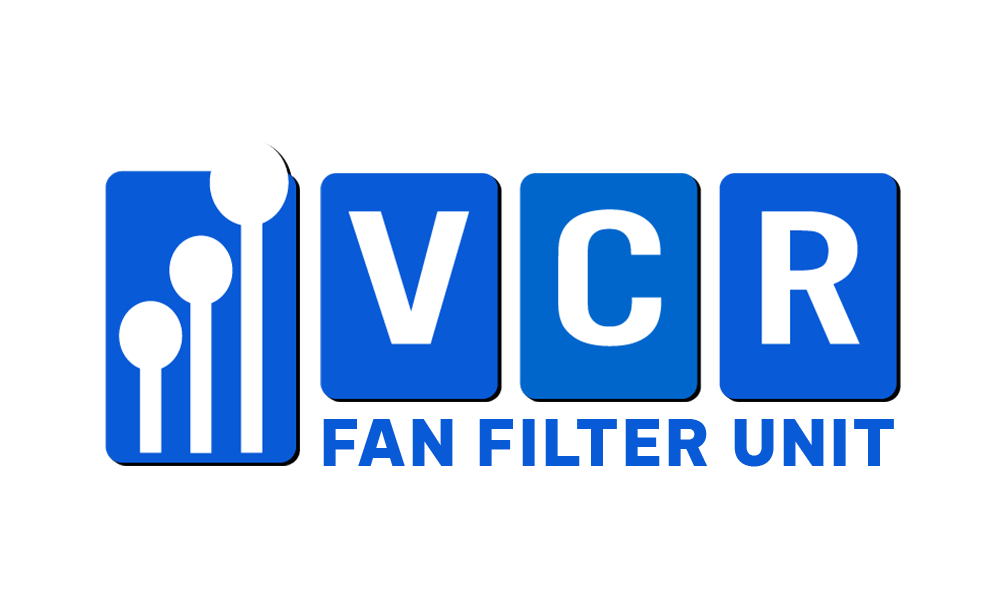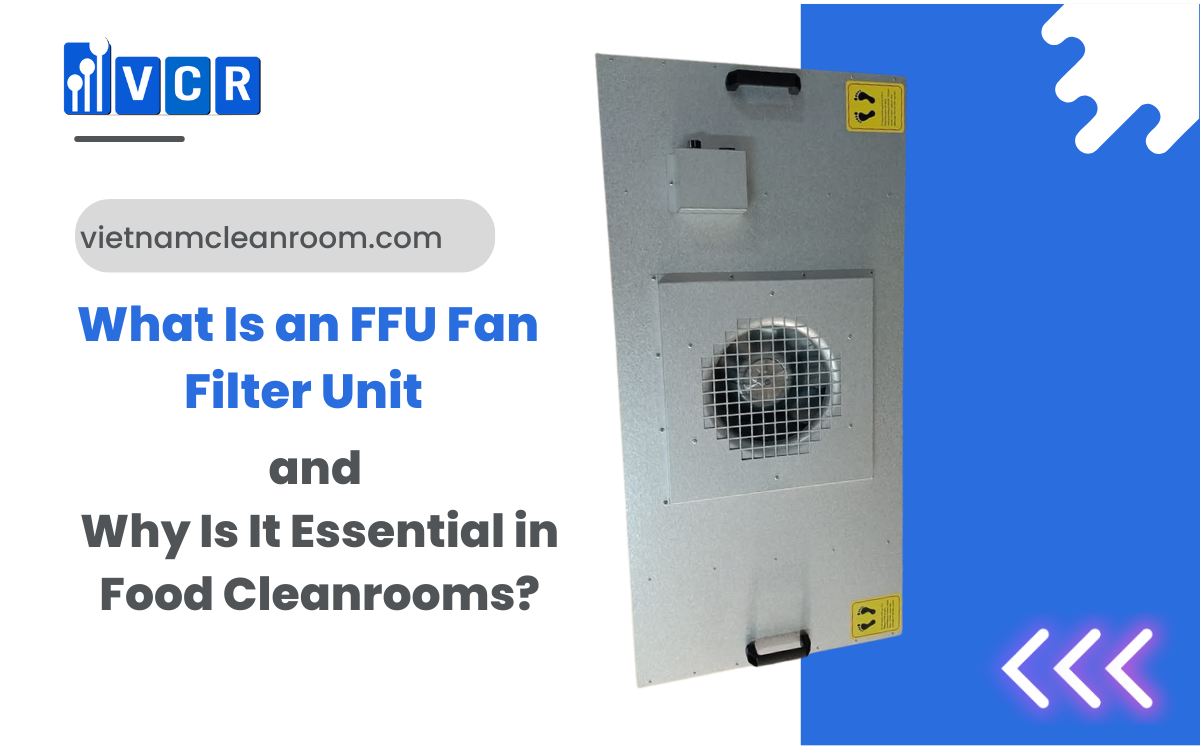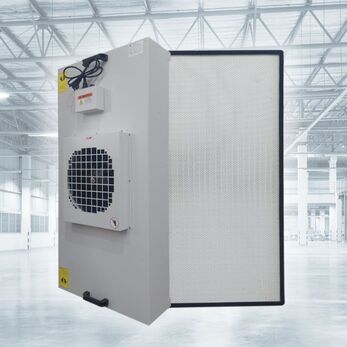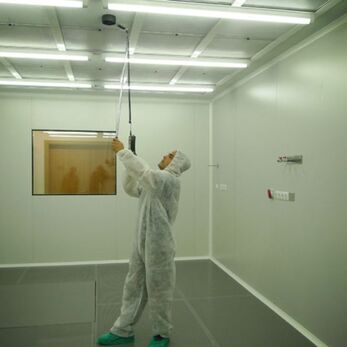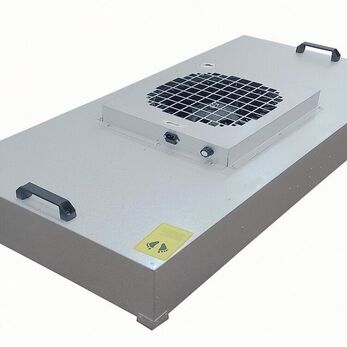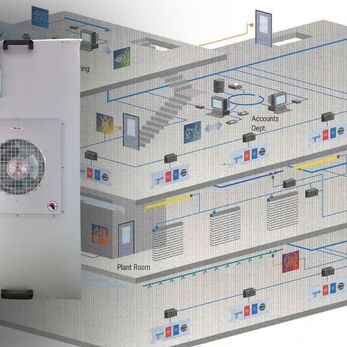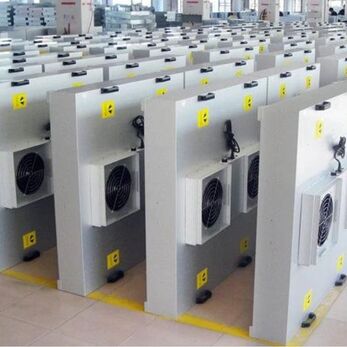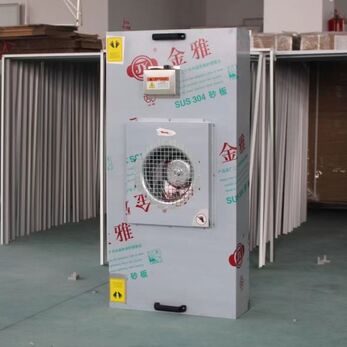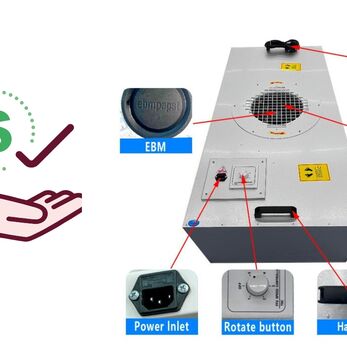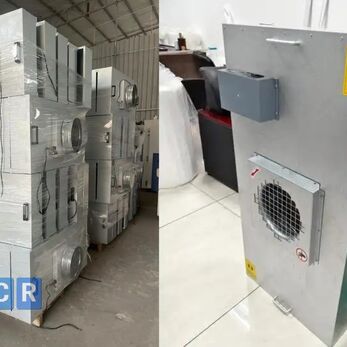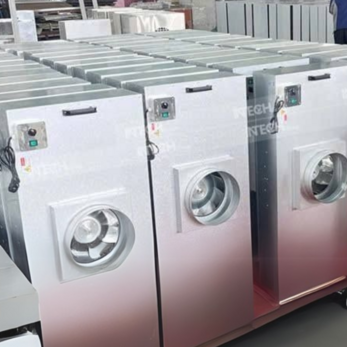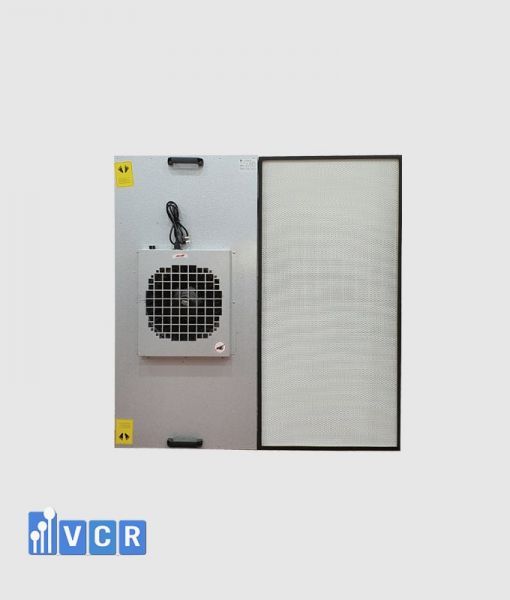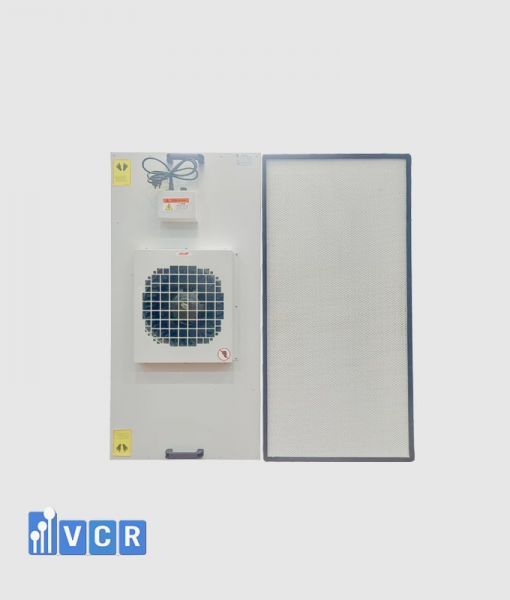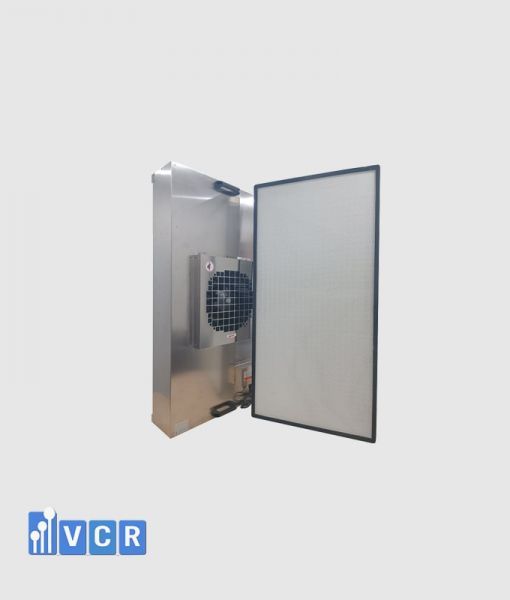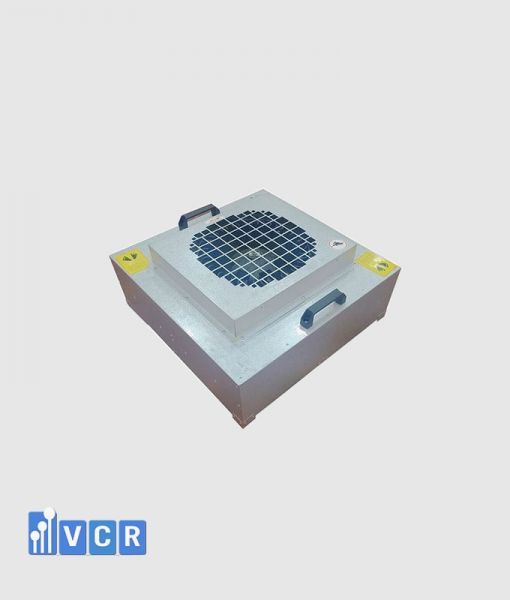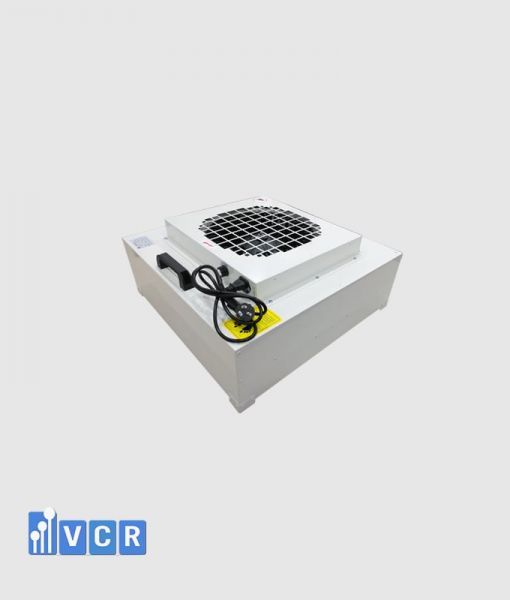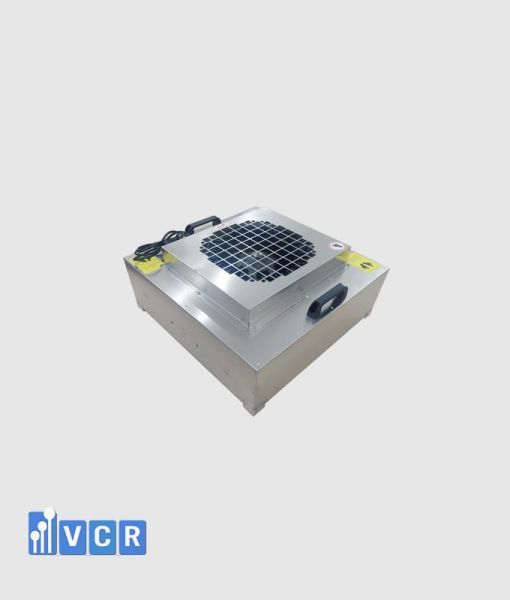Maintaining air purity is critical in food cleanrooms to prevent contamination and ensure compliance with safety standards. FFU Fan Filter Units provide high-efficiency air filtration, removing airborne particles and ensuring a sterile environment. Discover why FFUs are essential in food processing and how they enhance hygiene, product quality
I. Introduction
- Brief Introduction to Cleanrooms in the Food Industry
Cleanrooms are controlled environments designed to minimize contamination by regulating air quality, temperature, humidity, and particulate levels. In the food industry, cleanrooms are essential for ensuring product safety, hygiene, and compliance with strict food safety regulations such as HACCP (Hazard Analysis and Critical Control Points) and GMP (Good Manufacturing Practices).
- Importance of Air Filtration in Food Production
Airborne contaminants such as dust, bacteria, mold spores, and chemical particles pose a serious risk in food processing environments. Effective air filtration helps:
- Prevent microbial contamination in food products.
- Extend product shelf life by maintaining sterility.
- Reduce the risk of cross-contamination between different food batches.
- Ensure compliance with industry cleanliness standards and regulations.
- Introduction to FFU Fan Filter Units (What They Are and Their Role in Cleanrooms)
A Fan Filter Unit (FFU) is a self-contained filtration system that integrates a HEPA (High-Efficiency Particulate Air) or ULPA (Ultra-Low Penetration Air) filter with a fan to create a continuous supply of clean, filtered air. These units play a crucial role in maintaining clean air conditions in food cleanrooms by:
- Removing up to 99.99% of airborne contaminants, ensuring a sterile environment.
- Providing laminar airflow, which helps control airflow direction and prevents contamination from spreading.
- Supporting energy-efficient operations, making them a cost-effective solution for cleanroom air management.
By integrating FFU Fan Filter Units into food cleanrooms, manufacturers can significantly improve air quality, enhance food safety, and maintain a controlled production environment that meets regulatory requirements.
II. What Is an FFU Fan Filter Unit?
1. Definition
A Fan Filter Unit (FFU) is a self-contained air filtration system designed to supply clean and controlled airflow in critical environments like cleanrooms. It consists of an integrated fan and HEPA/ULPA filter, which work together to eliminate airborne contaminants, ensuring a sterile production space.
FFUs are commonly used in industries that require strict air purity, including food processing, pharmaceuticals, electronics, and healthcare. Their ability to filter out dust, bacteria, and other pollutants makes them an essential component in food cleanrooms, where maintaining hygiene is crucial for product safety and compliance with industry regulations.
2. How It Works
The FFU Fan Filter Unit operates through a three-step process:
- Air Intake – The unit draws in ambient air from the surrounding environment, which may contain dust, microbes, and other contaminants.
- Filtration Process – The air passes through a HEPA (High-Efficiency Particulate Air) or ULPA (Ultra-Low Penetration Air) filter, removing up to 99.99% of airborne particles, including bacteria and mold spores.
- Clean Air Distribution – The filtered air is evenly distributed across the cleanroom, creating a laminar airflow that prevents contamination from settling on food products or production equipment.
By continuously filtering and circulating air, FFU units help maintain a clean environment that meets strict cleanliness standards such as ISO 14644 and GMP (Good Manufacturing Practices).
3. Key Components
Each FFU Fan Filter Unit is composed of several critical components that contribute to its efficiency:
- Fan System – The built-in fan ensures a consistent airflow, allowing the unit to operate independently from the main HVAC system. This feature enhances energy efficiency and ensures clean air distribution.
- HEPA/ULPA Filter –
- HEPA filters capture particles as small as 0.3 microns with 99.97% efficiency.
- ULPA filters offer even higher filtration, removing 99.9995% of particles down to 0.12 microns.
- Housing Unit – A durable casing that encloses and protects the internal components from external contamination. It is usually made of stainless steel or aluminum, which ensures longevity and easy cleaning.
By integrating FFU Fan Filter Units into food cleanrooms, manufacturers can maintain superior air quality, minimize contamination risks, and ensure compliance with food safety standards.
III. Why Is an FFU Fan Filter Unit Essential in Food Cleanrooms?
1. Maintains Air Purity and Hygiene
Clean air is crucial in food cleanrooms to prevent contamination and ensure food safety. FFU Fan Filter Units play a vital role by:
- Preventing airborne contamination from affecting food products during processing, packaging, and storage.
- Reducing the risks of mold, bacteria, and dust, which can lead to spoilage, foodborne illnesses, and product recalls.
- Maintaining laminar airflow, which minimizes the spread of contaminants by directing filtered air uniformly across work surfaces.
By continuously filtering and circulating clean air, FFUs help create a contamination-free environment essential for food manufacturing.
2. Ensures Compliance with Food Safety Standards
The food industry is subject to stringent regulations to ensure hygiene and product safety. FFUs help manufacturers comply with:
- HACCP (Hazard Analysis and Critical Control Points) – Reducing contamination risks in critical production areas.
- GMP (Good Manufacturing Practices) – Ensuring a controlled environment for food processing.
- ISO 14644 Standards – Maintaining specific air cleanliness levels in cleanrooms.
- Food safety certifications (e.g., FDA, BRC, FSSC 22000) – Supporting compliance with global regulatory requirements.
By meeting these standards, FFU Fan Filter Units help food companies gain customer trust and avoid legal issues related to food contamination.
3. Enhances Product Quality and Shelf Life
Food products are highly sensitive to environmental conditions, and contamination can lead to spoilage, changes in taste, texture, and appearance. FFUs contribute to product integrity by:
- Minimizing contamination risks, ensuring food remains fresh and free from unwanted odors or particulates.
- Extending shelf life by reducing microbial exposure that accelerates spoilage.
- Preserving food quality by maintaining a stable and clean processing environment.
By using FFU Fan Filter Units, food manufacturers can significantly improve the quality and consistency of their products.
4. Improves Worker Safety and Productivity
In addition to protecting food products, FFUs contribute to a safer and more efficient working environment:
- Providing cleaner air for workers, reducing exposure to allergens, dust, and airborne bacteria.
- Lowering the risk of respiratory issues caused by airborne contaminants in enclosed production areas.
- Creating a stable and controlled workspace, leading to higher productivity and fewer disruptions due to contamination-related concerns.
A clean and safe work environment results in better employee health and efficiency, ultimately benefiting overall production output.
5. Energy Efficiency and Cost Savings
Modern FFU Fan Filter Units are designed to optimize energy consumption while maintaining high filtration performance. Their benefits include:
- Low energy consumption, making them more cost-effective than traditional HVAC systems.
- Long filter lifespan, reducing maintenance costs and downtime for filter replacements.
- Independent operation, allowing food manufacturers to customize airflow and filtration levels in different cleanroom zones, leading to optimized energy use.
By investing in FFU Fan Filter Units, food manufacturers save costs in the long run while maintaining superior air quality and compliance with industry standards.
IV. Applications of FFU Fan Filter Units in the Food Industry
FFU Fan Filter Units are widely used in the food industry to maintain controlled environments that ensure hygiene, food safety, and compliance with strict regulatory standards. Their ability to provide clean, filtered air makes them essential for various food production and storage processes.
1. Food Processing Plants
Food processing facilities handle raw ingredients and transform them into consumable products. Any airborne contamination in these environments can lead to food spoilage, product recalls, or even consumer health risks. FFU Fan Filter Units are used in:
- Dairy Processing: Prevents airborne contaminants from affecting milk, cheese, yogurt, and other dairy products.
- Meat and Seafood Processing: Reduces bacterial contamination in raw meat and seafood production areas.
- Bakery Production: Controls flour dust and airborne particulates that could compromise food safety and quality.
- Frozen Food Production: Ensures a clean environment free from moisture-related microbial growth.
By maintaining strict air filtration and airflow control, FFUs help preserve food quality, extend shelf life, and reduce contamination risks in these processing facilities.
2. Packaging and Bottling Facilities
Packaging is a critical phase in food manufacturing where even minor contamination can lead to significant quality issues. FFU Fan Filter Units help ensure a clean packaging environment by:
- Maintaining sterile conditions in food packaging lines to prevent contamination from dust, bacteria, and other airborne particles.
- Protecting bottled and canned beverages (e.g., water, juices, dairy drinks) from exposure to pollutants before sealing.
- Reducing the risk of microbial contamination in vacuum-sealed and airtight food packaging.
By ensuring cleanroom-grade air quality, FFUs enhance product integrity, reduce spoilage, and help companies comply with food safety regulations.
3. Food Storage and Cold Chain Logistics
Proper food storage is essential for preserving freshness and preventing spoilage. FFU Fan Filter Units are used in cold storage rooms, warehouses, and refrigerated logistics centers to:
- Prevent mold and bacterial growth by maintaining a contamination-free atmosphere.
- Control humidity levels that could affect food products during storage.
- Ensure consistent airflow, reducing temperature fluctuations and maintaining food quality.
For food manufacturers and distributors, FFUs in storage areas help maintain strict hygiene conditions throughout the supply chain, ensuring food remains safe and fresh until it reaches consumers.
4. Pharmaceutical and Nutraceutical Manufacturing
Food-related industries such as pharmaceuticals and nutraceuticals require the highest levels of air purity to comply with health and safety standards. FFUs are used in:
- Dietary supplement production: Ensures contamination-free processing of vitamins, protein powders, and health supplements.
- Infant formula manufacturing: Protects delicate powdered and liquid formulations from airborne contaminants.
- Functional food production: Provides a sterile environment for producing probiotics, fortified foods, and medicinal beverages.
By integrating FFU Fan Filter Units into these industries, manufacturers can guarantee product safety, consistency, and compliance with regulatory bodies like the FDA and WHO.
V. How to Choose the Right FFU Fan Filter Unit for Food Cleanrooms
Selecting the right FFU Fan Filter Unit is crucial for maintaining air quality, ensuring compliance with food safety standards, and optimizing operational efficiency. Below are key factors to consider when choosing an FFU for food cleanrooms.
1. Airflow Capacity and Filter Type
The effectiveness of an FFU depends on its airflow performance and the type of filter used.
- Airflow Capacity:
- Choose an FFU with an airflow rate that matches the cleanroom's air change requirements.
- Higher airflow capacity is needed for areas with higher contamination risks.
- Filter Type:
- HEPA filters (High-Efficiency Particulate Air): Removes 99.97% of airborne particles as small as 0.3 microns.
- ULPA filters (Ultra-Low Penetration Air): Removes 99.9995% of particles down to 0.12 microns, offering higher filtration efficiency.
- Ensure that the selected filter meets ISO 14644 cleanroom classification for food processing.
2. Energy Efficiency and Noise Level
Since food cleanrooms require continuous air filtration, energy efficiency plays a critical role in long-term cost savings.
- Low-energy consumption motors help reduce electricity costs without compromising performance.
- EC (Electronically Commutated) motors are recommended for their variable speed control and energy efficiency.
- Noise Level:
- Choose an FFU with a noise level below 50-60 dB(A) to ensure a comfortable working environment.
- Excessive noise can affect worker productivity and compliance with workplace safety regulations.
3. Compliance with Cleanroom Standards
Ensuring that the FFU meets industry regulations is essential for maintaining food safety and passing audits.
- Look for certified units that comply with:
- ISO 14644 standards for air cleanliness in food production areas.
- HACCP and GMP (Good Manufacturing Practices) guidelines for food safety.
- FDA and local food safety regulations to ensure legal compliance.
- Check whether the FFU has built-in monitoring systems for airflow and filter performance to maintain continuous compliance.
4. Maintenance and Replacement Considerations
A well-maintained FFU ensures long-lasting performance and reduces downtime.
- Easy filter replacement: Choose units with accessible filter compartments to minimize maintenance time.
- Long filter lifespan: Opt for high-quality HEPA/ULPA filters that provide extended service life before needing replacement.
- Fan durability: Select FFUs with brushless motors for longer operational lifespan and lower maintenance costs.
- Real-time monitoring: Some advanced FFUs offer digital airflow monitoring and filter replacement alerts to simplify maintenance.
VI. Conclusion
FFU Fan Filter Units play a vital role in maintaining air purity in food cleanrooms, ensuring a controlled environment that meets the highest hygiene and safety standards. By effectively removing airborne contaminants, FFUs help prevent food contamination, improve product quality, and extend shelf life.
These units are essential for achieving compliance with food safety regulations such as HACCP, GMP, and ISO 14644, helping food manufacturers pass audits and maintain industry certifications. Their ability to provide consistent, high-efficiency air filtration makes them indispensable in food processing, packaging, storage, and nutraceutical manufacturing.
Investing in high-quality FFU Fan Filter Units not only enhances food safety but also improves operational efficiency and reduces long-term costs. By choosing the right FFU system, food manufacturers can optimize cleanroom performance, protect their brand reputation, and meet the growing demand for safe and hygienic food products.
Looking for High-Performance FFU Fan Filter Units?
VCR Cleanroom Equipment provides top-quality FFU Fan Filter Units designed for food cleanrooms. Our solutions help food manufacturers achieve superior air quality, regulatory compliance, and cost efficiency.
Hotline: 090.123.9008 (Call/Zalo 24/7)
Email: [email protected]
Website: vietnamcleanroom.com
Ensure a cleaner, safer food production environment with VCR Cleanroom Equipment today!


